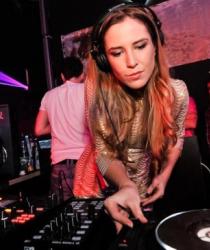
Phoebe d’Abo is waiting for a plane at Gatwick airport; it’s a regular haunt and an occupational hazard for a DJ who has become one of the global elite of her profession, with a fully booked schedule stretching almost a year ahead. “Very occasionally, I might think ‘not another plane’, but I never voice it,” she says. “I’ve heard that kind of thing before from people who don’t seem to realise how lucky they are to be doing what they love for a living and I’ve always thought: ‘How dare you?’ It’s a small price to pay.”
It’s a long way from the bucolic surroundings of Bedales, which Phoebe joined at the age of 13, inspired by her older sister, who had thrived at the school since her own arrival. “I had been at Alleyn’s School in South London, where I had loved my extra-curricular activities, but had found the atmosphere to be extremely pressurised,” she recalls. “Applying to Bedales seemed like sensible timing. From the moment that I sat the entrance test, I had no hesitation that this was the place for me. I loved it in all its aspects; I wasn’t particularly competitive, which was fine, and I’m not sure that I ever knew which house I was in, but I threw myself into the arts and the outdoor activities. It was a huge privilege to be allowed to achieve things at my own pace in a fun environment. I’ve no doubt that a lot of the friendships that I made at Bedales will be lifelong ones.”
Phoebe played the piano at Bedales (“not too successfully, because I had a terrible attention span,” she laughs) and continued to amass a formidable and eclectic collection of music. “At school, most people were heavily into indie music,” she reflects. “I went through more of a hip-hop phase at Bedales, but got into the electronic sound fairly young, partly thanks to my older, cooler sister (Polly d’Abo OB 1998-2001). I remember asking for my first Ibiza Annual at the age of eleven, loving it and gradually building a solid collection of dance records throughout my teens.” As time progressed, Phoebe’s range of interests became epitomised by her choice of A Levels: Spanish, biology, art and dance. “They were quite an unconventional mix, I guess, and there were those who said that I was shooting myself in the foot by choosing them, but that was the great thing about Bedales – you could always go for what you wanted. For example, my sister had once put on a play at the school and I decided that I wanted to do so as well. I had no previous experience and wasn’t part of the theatre group, but that didn’t matter; if you were keen, you could have a go.”
From the moment that I sat the entrance test, I had no hesitation that this was the place for me. I loved it in all its aspects
During her penultimate year at school, Phoebe had the opportunity to visit India, where a chance encounter was to revolutionise her thinking about her future. “At the time, I felt the correct, admirable answer was ‘doctor’, but instead of giving me a pat on the back, the guru asked me what I was truly passionate about. Without hesitation, I said that the things that made me happiest were music, dance and languages. His immediate response questioned why I couldn’t pursue something that involved those passions full-time. It was a light bulb moment – why shouldn’t I do what I love?”
The idea of a gap year was shelved. Instead, Phoebe was accepted by Bodywork Company Dance Studios, part of Cambridge Performing Arts, on a one-year foundation course to study dance. “I thought that I would keep all my options open,” says Phoebe. “I wanted to see how far I could go.” Before that, however, there would be time for a holiday in Ibiza, European centre of a different kind of dance altogether. The club scene and the music that fuelled it were irresistible to Phoebe. “I was inspired and desperate to learn how to mix my own music collection together,” she explains. “I was obviously going to be dancing up in Cambridge most of the time, but on two evenings each week, I would go down to London and learn from a guy called Graeme Lloyd what DJing was all about. At that point, it was just a big interest – it never entered my head that it might be a career.”
As her dance course branched into more generally theatrical avenues, so Phoebe’s introduction to the intricacies of the DJ’s art gathered speed. “The more I practised, the better I got,” she says. “I found that it clicked quite quickly, that I was perhaps able to see things that others weren’t. Something like laying an a cappella vocal over a different track seemed to come naturally to me in a way that made me think that I might have some kind of talent for this.” While she was being admonished at Bodywork for sometimes failing to wear enough make-up for her routines, Phoebe suddenly started to be noticed as a DJ of rare ability and versatility. A trickle of invitations to DJ at clubs and corporate events became a stream. All at once, her professional future became crystal clear.
Phoebe is one of a number of women who have recently made an impact on what has long been regarded as a man’s world in which sexism is never far away. She acknowledges the point but has little patience with those who are obsessed with it. “Too many female DJs make too much of an issue of it,” she believes. “I think that there are some who do so because they may be a little insecure about their own abilities. There are so many positives about being a girl in this line of work; I’ve even had jobs handed to me on a plate simply because I’m female.”
The global explosion in the club scene has come at a convenient time for Phoebe and her contemporaries. “The scene is everywhere now,” she says. “It’s not just Ibiza and Greece and the rest of Europe and the US. On my birthday, for instance, I was playing in Ghana. There are places like Thailand, Brazil, Dubai, China…you name it. There are no barriers. The market is saturated and there seem to be more DJs than ever but there is still plenty of work to go round for the people who are doing it for the right reasons.”
I’ve no doubt that a lot of the friendships that I made at Bedales will be lifelong ones
Phoebe herself maintains a manic workload, working at prestigious events such as London Fashion Week, appearing at some of the world’s biggest festivals (most recently Creamfields) and most exclusive clubs and now, as part of the Hed Kandi clubbing label, producing her brand of house and dance music on an ever more global stage. “I’ve had to learn on the job how different the dance sound can be in different territories,” she says. “You’ve always got to be able to adapt to what people want.”
Despite all the travelling, Phoebe’s heart remains in Ibiza, where everything first started for her. She is consequently unamused by the recent furore created by three of the world’s most eminent (and highest-paid) DJs, Afrojack, Paul Oakenfold and Steve Angello, who suggested that the island has become too expensive for young people and lost some of its original magic. “Hilarious, isn’t it?” she says “The big names that are complaining are exactly those who will charge the earth for a two-hour set. I think we can safely ignore them. It is tough for some of the DJs who don’t work in the winters and then find themselves squeezed when the top guys ride into town, but Ibiza is still a place with masses of diversity and charm. Like everywhere else, there is an underground scene, featuring venues that not so many people know and are brilliant to play. Trends change, but the vibe is still there. With any luck, one of the trends that will change in the future is that the superstar DJ thing will implode on itself!”
She may be a London girl but Phoebe d’Abo is a citizen of the world these days. Madrid has been her home in recent times; the next step may be a permanent foothold in Ibiza. “I’m already looking for a place of my own there,” she admits. “I’d love to be based in Ibiza. It’s expensive, yes, but definitely no more so than London, and I’d get to keep my Spanish brushed up. The truth is that it doesn’t matter too much from a professional point of view where I call home. The only condition is that it has to be within easy range of an airport!”
Phoebe D’Abo was interviewed by James Fairweather in August 2014.

